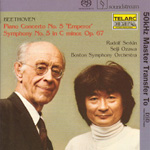When this recording first appeared in the 1980s, it was notable for its unprecedented realism in reproducing the sound of the Boston Symphony. Telarc made judicious use of Symphony Hall’s resplendent acoustics, giving the listener an uncanny feeling of “being there”. Particularly impressive was the natural balancing of the piano with orchestra, a feat as revelatory as it was refreshing after so many gimmicky concerto recordings with their gargantuan-sounding pianos. These qualities come through with a marked increase in fidelity in this new DSD/SACD transfer, which captures the full spectrum of the original Soundstream recording.
Alas, the performances sound as lackluster today as they did in 1981. Rudolf Serkin displays his storied aristocratic poise, playing with much character and refinement. But the fire that informed his earlier days had dimmed considerably by the time of this recording. On the other hand, Seiji Ozawa’s safe, auto-pilot conducting in both the concerto and the symphony proves he is definitely not a compelling Beethoven interpreter (although the Boston players make quite a good show of themselves in the symphony’s finale). Still, as a record of the great pianist’s last run through the Emperor Concerto, this recording inevitably holds some interest for die-hard Serkin fans. That being the case, they should certainly hear it in the highest fidelity possible.
































